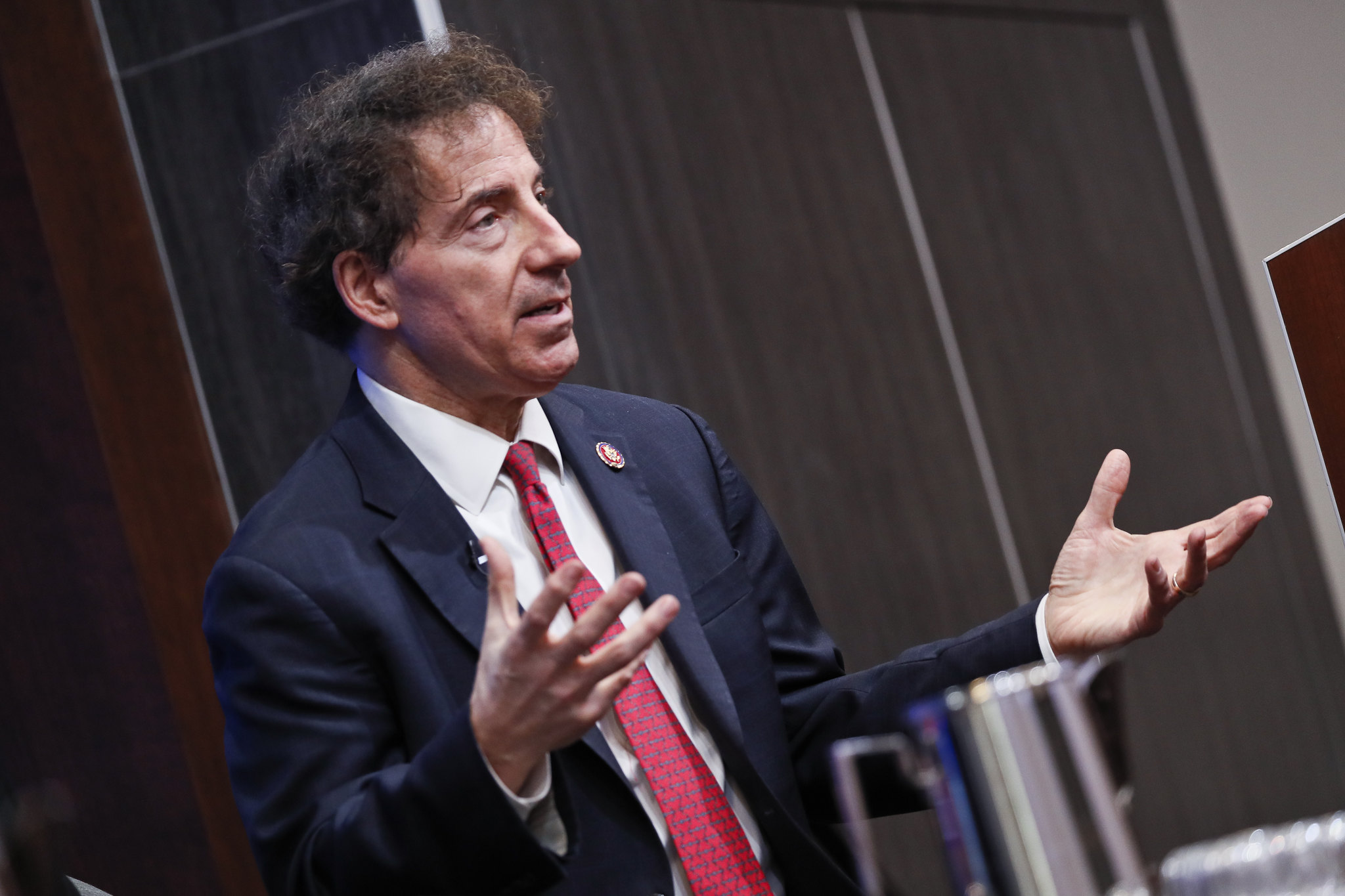Every other day, it seems like the White House is clawing back federal support for bike lanes or shrinking the role of Washington in building "local" active transportation projects, even as the deaths of people outside cars make national car crash statistics explode. For Rep. Jamie Raskin (D–Md.), though, that means its more important than ever to pass legislation that hands states more power to use their federal funds to save vulnerable road users' lives — and for the first time, he's being joined in his efforts by colleagues across the aisle.
Along with two Republican co-sponsors, Raskin recently re-introduced the Sarah Debbink Langenkamp Act, which will allow state and local communities to fund the construction of bike lanes and other proven safety countermeasures built under the Transportation Alternatives Program using 100 percent federal money, rather than having to scrounge up a 20 percent match they often can't afford.
And because that bill would also allow local, regional and metropolitan governments to nominate projects directly — rather than leaving them to the mercy of higher levels of government that might be hostile to biking and walking for ideological reasons — it's vaulted to the top of many advocates' legislative wish lists, while gaining support from conservatives who understand the value of letting communities guide their own road safety efforts.
We sat down with Rep. Raskin to talk about why Congress is coalescing around this critical issue, what it will take to finally get the Langenkamp Act over the finish line, and how the fight for vulnerable road user safety is changing during the second Trump presidency.
This interview has been lightly edited for clarity and length.
Streetsblog: Why is now the ideal moment to reintroduce this bill, and to provide more ways for states to allocate their federal resources to biking and walking?
Rep. Jamie Raskin: We need to be making an active and robust federal investment in the safety of our streets. This bill will make it possible to fund 100 percent of transportation projects costs from federal funds, rather than asking the hard-hit, stressed out state and local governments to pay for part of it — and it would allow local projects to nominate eligible projects directly.
That way, it doesn't necessarily have to go through the State Department of Transportation, which might not know all of the details. The carnage on our highways and roads is just intolerable, and I think the public wants to see real action. We need to make this a serious national priority, and not just something that every local government struggles with on its own.
Streetsblog: I agree, but I do want to recognize that we're in a difficult political moment where the secretary of transportation is directing staff to essentially do a line-by-line review of all discretionary grants for words like "bicycle infrastructure," and flag projects for possible rescission if they're not yet fully obligated. In an era when hostility to active transportation infrastructure is becoming so overt, are you confident about the prospects for this bill?
Raskin: There is an ideological crusade going on within MAGA against a whole bunch of taboo buzzwords. Obviously, diversity, equity, and exclusion are at the top of that list, but there are some people who treat "bike safety" or "bicycle infrastructure" or,"bicycle and pedestrian friendly" as woke code words for something nefarious.
And that's dangerous. It means that we can't take the steps we need as a democratic society to make our lives safer on the roads.
But I'm glad that there are Republican members [such as co-sponsors Derrick Van Orden and Bryan Steil, both of Wisconsin] who recognize the peril in that. And I'm glad that they're willing to step up to work with us on this legislation to expand access to federal funding opportunities for local governments to advance roadway safety.
Streetsblog: Unfortunately, the "local" piece of this bill also feels unusually controversial right now. U.S. DOT Secretary Sean Duffy issued a different memo that saying that DOT-supported programs and activities should "not be used to further local political objectives or for projects and goals that are purely local in nature and unrelated to a proper federal interest." But it doesn't elaborate on what a "proper federal interest" is, or what "purely local in nature" really means. How can we build support for a bill in an anti-localist political climate?
Raskin: The legislation embodies the value of road safety as a national priority. We have an absurdly high number of road fatalities; that's a tragedy for a family and friends, and it's a tragedy for the community. But it's also a tragedy for the country too, when you look at it in the aggregate. We need to reject any insinuation that it's not a national priority to make local roads safer.
Streetsblog: What can advocates do to support this legislation — and to more broadly, to support rethinking the fundamentals of how we structure road safety funding in this country?
Raskin: Everybody definitely can get in touch with their own representatives and senators to make sure that they are getting on the Langenkamp legislation. I mean, obviously, there's a lot going on in America today, but a very big turnout in terms of communication from constituents will make a big difference in terms of our ability to put some real momentum behind the legislation.
There are excellent groups that are advocating for people on bikes and pedestrians, and excellent publications like yours that are calling attention to this situation. People need to get involved, and make this [issue] a part of their overall political life. Not everybody is going make this their primary political commitment, but I think everybody can express support in different ways.






